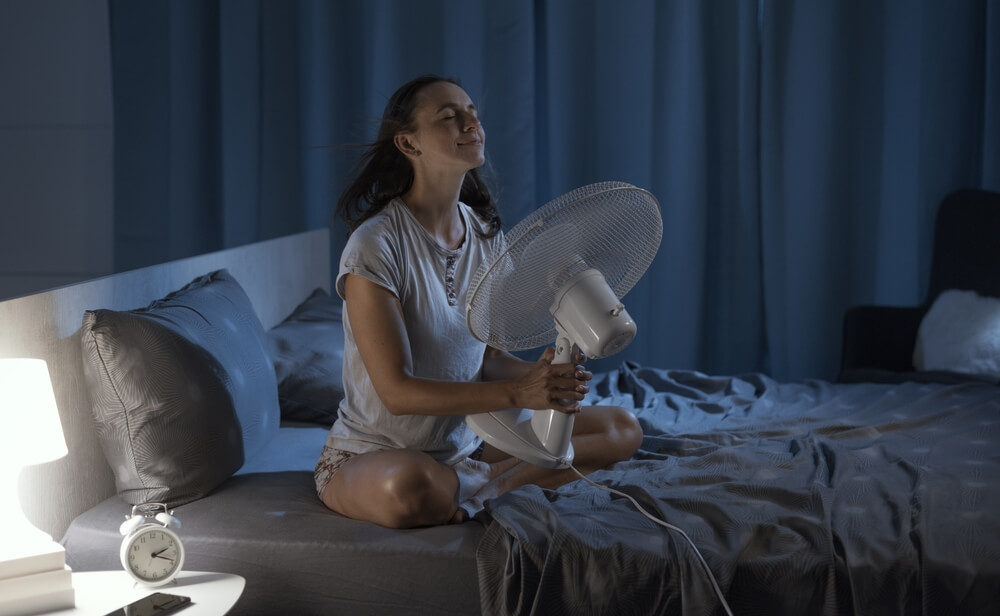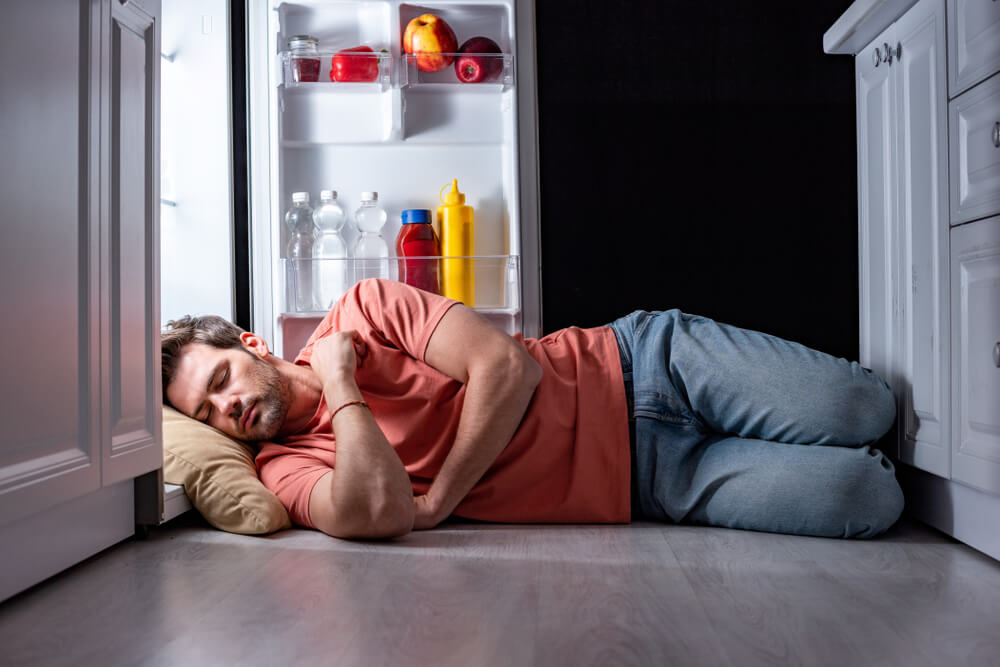Five Tips for Sleeping in the Heat

Falling asleep can seem like an impossibility on hot summer nights. However, there are some useful tips for sleeping in the heat that can be of great benefit and will help you get a good night’s sleep.
After a long day at work, it’s exhausting to get into bed and find yourself tossing and turning all night. Nevertheless, this is a typical scenario for many people who aren’t used to hot or tropical climates. In fact, it can have detrimental consequences on your health, productivity, and mood. Fortunately, there are some strategies you can employ.
Five tips for sleeping in the heat
Staying cool when summer hits can be really complex. Even more so in the case of people who are traveling and come from a locality where it’s not so warm. However, instead of losing your cool when you feel sleepy but can’t rest, bear in mind the following tips for sleeping in the heat.
1. Keep the room as cool as possible
Not allowing heat to accumulate in your bedroom is crucial to ensuring good ventilation, both during the day and at night. If you don’t have air-con, buy the best fan you can according to your budget or put several buckets of ice in the room to reduce the heat.
Also, remember to close the windows and blinds that receive direct sunlight during the day. Wooden or ceramic floors tend to absorb a lot of heat, which increases the temperature. Reopen the windows briefly at night to allow air circulation.

2. Use natural supplements
If it’s really difficult for you to get proper rest without any interruptions, there are some products with natural active ingredients that can help you fall asleep. These usually contain melatonin, magnesium, or valerian root supplements among their main ingredients. These are ingredients that encourage sleep.
A recent study dedicated to analyzing the effect of melatonin supplementation on sleep quality found extremely positive effects. It proved to be a really useful treatment in helping the participants rest. This was regardless of whether they suffered from respiratory diseases, sleep disorders, or neurodegenerative diseases, among other conditions.
3. Take a warm shower
Research has shown that a warm shower before going to bed can be of great help in improving sleep onset latency. It’s a practical and simple strategy that promotes thermoregulatory changes which allow improvements in sleep efficiency and quality.
So, if you find yourself in a warm place, taking a warm shower or bath is a great idea. In addition, when your skin is damp and it comes into contact with the air, it makes you feel fresher and reduces your body temperature.
4. Avoid eating heavy meals
Diet and sleep are more closely related than you might think. This was confirmed by a recent study led by professionals from Central Queensland University (Australia). It showed that the consumption of foods containing tryptophan, melatonin, and phytonutrients (eg, cherries, oats, and vegetables) are of great benefit in falling asleep.
For this reason, it’s preferable to eat salads, since they’re light meals, easy to digest, and with optimal ingredients to promote rest. You should avoid the consumption of heavy or hot dishes, such as fast food and roasts since your body requires more heat to digest them.

5. Keep calm
Tossing and turning all night after a long day at work is exhausting and can lead to a great deal of frustration, anger, and even anxiety. Therefore, if none of the above tips work, try to stay calm and distract your mind with another activity.
Reading a book, writing in a journal, or folding laundry can be really beneficial distractions. However, try to stay away from smart screens, be it your cell phone, television, or computer. In fact, research has proved that the use of these devices is associated with a significant increase in fatigue and insomnia.
Put these tips into practice when sleeping in the heat
When temperatures rise or you find yourself traveling in a hot place, you can employ these strategies to stay cool and get a good night’s sleep. After all, sleep is essential for staying healthy.
Falling asleep can seem like an impossibility on hot summer nights. However, there are some useful tips for sleeping in the heat that can be of great benefit and will help you get a good night’s sleep.
After a long day at work, it’s exhausting to get into bed and find yourself tossing and turning all night. Nevertheless, this is a typical scenario for many people who aren’t used to hot or tropical climates. In fact, it can have detrimental consequences on your health, productivity, and mood. Fortunately, there are some strategies you can employ.
Five tips for sleeping in the heat
Staying cool when summer hits can be really complex. Even more so in the case of people who are traveling and come from a locality where it’s not so warm. However, instead of losing your cool when you feel sleepy but can’t rest, bear in mind the following tips for sleeping in the heat.
1. Keep the room as cool as possible
Not allowing heat to accumulate in your bedroom is crucial to ensuring good ventilation, both during the day and at night. If you don’t have air-con, buy the best fan you can according to your budget or put several buckets of ice in the room to reduce the heat.
Also, remember to close the windows and blinds that receive direct sunlight during the day. Wooden or ceramic floors tend to absorb a lot of heat, which increases the temperature. Reopen the windows briefly at night to allow air circulation.

2. Use natural supplements
If it’s really difficult for you to get proper rest without any interruptions, there are some products with natural active ingredients that can help you fall asleep. These usually contain melatonin, magnesium, or valerian root supplements among their main ingredients. These are ingredients that encourage sleep.
A recent study dedicated to analyzing the effect of melatonin supplementation on sleep quality found extremely positive effects. It proved to be a really useful treatment in helping the participants rest. This was regardless of whether they suffered from respiratory diseases, sleep disorders, or neurodegenerative diseases, among other conditions.
3. Take a warm shower
Research has shown that a warm shower before going to bed can be of great help in improving sleep onset latency. It’s a practical and simple strategy that promotes thermoregulatory changes which allow improvements in sleep efficiency and quality.
So, if you find yourself in a warm place, taking a warm shower or bath is a great idea. In addition, when your skin is damp and it comes into contact with the air, it makes you feel fresher and reduces your body temperature.
4. Avoid eating heavy meals
Diet and sleep are more closely related than you might think. This was confirmed by a recent study led by professionals from Central Queensland University (Australia). It showed that the consumption of foods containing tryptophan, melatonin, and phytonutrients (eg, cherries, oats, and vegetables) are of great benefit in falling asleep.
For this reason, it’s preferable to eat salads, since they’re light meals, easy to digest, and with optimal ingredients to promote rest. You should avoid the consumption of heavy or hot dishes, such as fast food and roasts since your body requires more heat to digest them.

5. Keep calm
Tossing and turning all night after a long day at work is exhausting and can lead to a great deal of frustration, anger, and even anxiety. Therefore, if none of the above tips work, try to stay calm and distract your mind with another activity.
Reading a book, writing in a journal, or folding laundry can be really beneficial distractions. However, try to stay away from smart screens, be it your cell phone, television, or computer. In fact, research has proved that the use of these devices is associated with a significant increase in fatigue and insomnia.
Put these tips into practice when sleeping in the heat
When temperatures rise or you find yourself traveling in a hot place, you can employ these strategies to stay cool and get a good night’s sleep. After all, sleep is essential for staying healthy.
All cited sources were thoroughly reviewed by our team to ensure their quality, reliability, currency, and validity. The bibliography of this article was considered reliable and of academic or scientific accuracy.
- Binks H, E Vincent G, Gupta C, Irwin C, Khalesi S. (2020). Effects of Diet on Sleep: A Narrative Review. 2020 Mar 27;12(4):936. doi: 10.3390/nu12040936. PMID: 32230944; PMCID: PMC7230229. Disponible en: https://pubmed.ncbi.nlm.nih.gov/32230944/
- Exelmans L, Van den Bulck J. (2016). Bedtime mobile phone use and sleep in adults. Soc Sci Med. 2016 Jan; 148:93-101. doi: 10.1016/j.socscimed.2015.11.037. Epub 2015 Dec 2. PMID: 26688552. Disponible en: https://pubmed.ncbi.nlm.nih.gov/26688552/
- Fatemeh G, Sajjad M, Niloufar R, Neda S, Leila S, Khadijeh M. (2021). Effect of melatonin supplementation on sleep quality: a systematic review and meta-analysis of randomized controlled trials. J Neurol. 2022 Jan;269(1):205-216. doi: 10.1007/s00415-020-10381-w. Epub 2021 Jan 8. PMID: 33417003. Disponible en: https://pubmed.ncbi.nlm.nih.gov/33417003/
- Whitworth-Turner C, Di Michele R, Muir I, Gregson W, Drust B. (2017). A shower before bedtime may improve the sleep onset latency of youth soccer players. Eur J Sport Sci. 2017 Oct;17(9):1119-1128. doi: 10.1080/17461391.2017.1346147. Epub 2017 Jul 9. PMID: 28691581. Disponible en: https://pubmed.ncbi.nlm.nih.gov/28691581/
This text is provided for informational purposes only and does not replace consultation with a professional. If in doubt, consult your specialist.







